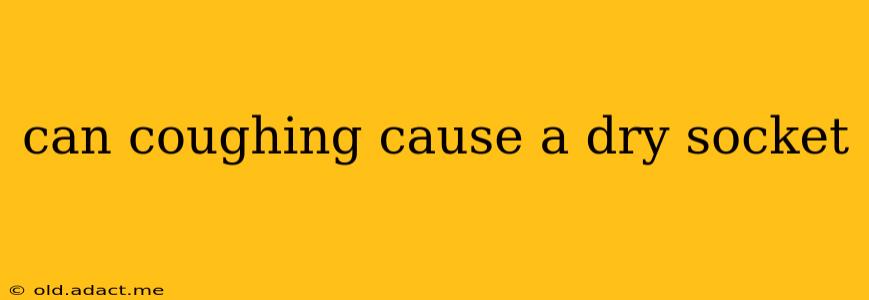Dry socket, also known as alveolar osteitis, is a painful complication that can occur after a tooth extraction. It's characterized by the absence of a blood clot in the extraction site, exposing the underlying bone and nerve endings. While coughing isn't a direct cause of dry socket, it can certainly exacerbate the problem or increase the risk, especially in the critical healing period immediately following the extraction. Let's delve deeper into this connection.
What is a Dry Socket?
Before we explore the link between coughing and dry sockets, it's important to understand what a dry socket is. A blood clot is crucial for the healing process after tooth extraction. This clot protects the exposed bone and nerves, providing a scaffold for new tissue growth. If this clot dislodges or fails to form properly, a dry socket develops, leading to intense pain, bad breath, and sometimes even a visible, empty socket.
Can Coughing Dislodge a Blood Clot?
Yes, forceful coughing can potentially dislodge the fragile blood clot that's forming in the extraction site. This is particularly true in the first few days following the extraction when the clot is still developing and hasn't fully adhered to the socket. The increased pressure from a strong cough can disrupt this delicate process, leading to a dry socket.
How Can I Reduce My Risk of Dry Socket After a Tooth Extraction?
Following your dentist's post-operative instructions meticulously is paramount to minimizing your risk of developing a dry socket. These instructions typically include:
- Avoiding smoking: Smoking significantly hinders blood clot formation and increases the risk of dry socket.
- Gentle rinsing: Use a prescribed mouthwash as directed. Avoid forceful rinsing or spitting, which could dislodge the blood clot.
- Avoiding straws: Suction created by straws can disrupt the blood clot.
- Soft food diet: Chew on the opposite side of the extraction site to avoid disturbing the area.
- Managing pain effectively: Following prescribed pain medication helps reduce the frequency and intensity of coughing that may be triggered by pain.
What Other Factors Contribute to Dry Socket?
While coughing can contribute, it's not the sole cause of dry socket. Other factors that increase the risk include:
- Poor oral hygiene: Bacteria can impede healing and increase the risk of infection, which might lead to dry socket.
- Use of birth control pills: Some studies suggest a link between oral contraceptive use and an increased risk.
- Previous history of dry socket: Individuals who have experienced dry socket in the past are at higher risk for recurrence.
- Difficult extractions: Complex extractions that involve significant trauma to the bone or soft tissues have a higher dry socket risk.
What Should I Do If I Think I Have a Dry Socket?
If you experience severe pain, bad breath, or a visible empty socket after a tooth extraction, contact your dentist immediately. Early intervention is crucial for managing a dry socket and promoting healing.
How Can I Minimize Coughing After a Tooth Extraction?
If you have a cough unrelated to your tooth extraction (like a common cold), try to:
- Stay hydrated: Drinking plenty of fluids can help loosen mucus and reduce coughing.
- Use cough suppressants: Follow your doctor's advice on over-the-counter cough medications. Ensure they won't interfere with any post-extraction medication.
- Rest: Getting enough sleep helps your body fight infection and recover.
By understanding the relationship between coughing and dry socket, you can take proactive steps to minimize the risk and ensure a smoother recovery after a tooth extraction. Remember, always follow your dentist’s post-operative instructions carefully.
